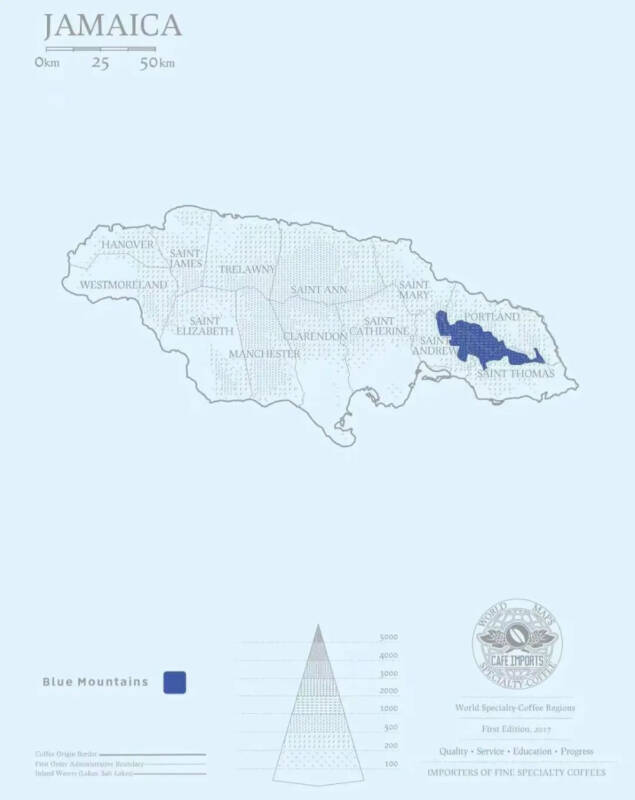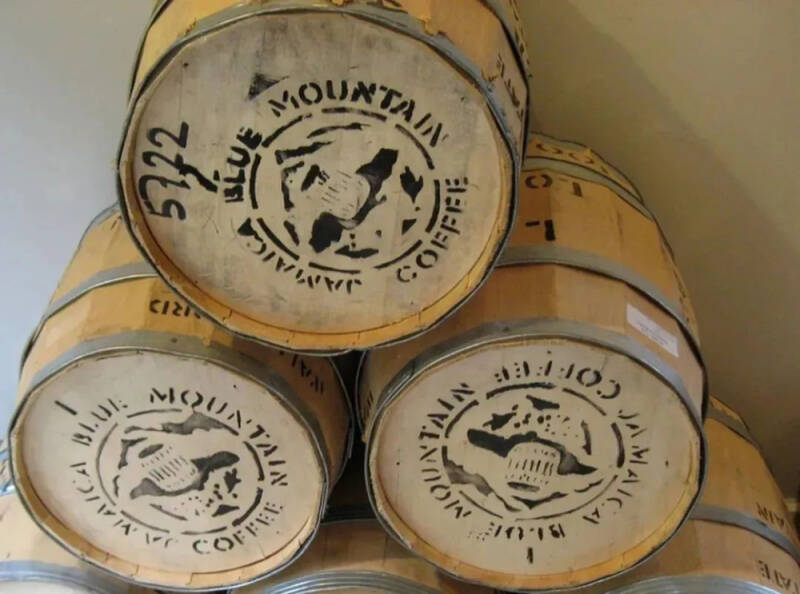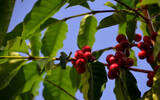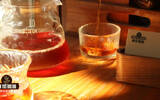Why is the Blue Mountains of Jamaica so expensive? What are the characteristics of Blue Mountain Coffee?
For a long time, Blue Mountain Coffee has a very high reputation, often associated with the best, most expensive, rarest and other high-quality adjectives, but also won the title of "coffee emperor". Blue Mountain Coffee is actually produced from the Blue Mountains in eastern Jamaica.
Jamaica is an island country in the northwest of the Caribbean Sea. In the east of the country is the famous Blue Mountains. The main peak of the Blue Mountains is 2256 meters above sea level. It is the highest peak in the Caribbean and has many peaks above 1500 meters above sea level. Located in the Pacific Rim volcanic earthquake belt, the Blue Mountains have fertile volcanic soil, a humid and rainy climate, is covered with fog all the year round, and the temperature remains around 27 ℃. This climate and natural environment have created the world-famous Jamaican Blue Mountain Coffee.
The name of the Blue Mountain Mountains comes from many years ago, when a British soldier arrived in Jamaica, he saw that the peak of the mountain was shrouded in blue light, which looked like a blue mountain as a whole, so he called it Blue Mountain. In fact, this is the Blue Mountains surrounded by the sea, in good weather, the sun falls on the sea, because the sea refracts light, so it refracts on the mountains of this mountain, showing blue.
Coffee first came to Jamaica in the 18th century, when a Jamaican governor introduced Arabica coffee seeds from Martinique and planted them in the eastern St Andrew region. Coffee cultivation later spread from St. Andrews to the entire Blue Mountain region. At that time, Jamaica had more than 600 coffee plantations. Thanks to the Jamaican geographical environment and climate, the coffee quality was very good. It is deeply loved by coffee consumers around the world.
In the late 1960s, the whole island of Jamaica was hit by hurricanes, both coffee and other crops were destroyed by hurricanes, causing heavy losses, and the coffee industry began to decline. But during this period, Japan had a developed economy and liked Blue Mountain Coffee very much, so several Japanese trading companies provided loans to the famous Blue Mountain Chicken Manor in exchange for shares and obtained the right of preemption.
In order to thank Japanese companies for their help, the Jamaican government signed a 30-year supply contract with Japan in 1972. 90% of the coffee produced by Jamaica each year will be supplied to Japan, and the rest will be supplied to other countries, so exports are very small. After that, the Japanese set off a "Blue Mountain craze" through propaganda, and a very small amount coupled with successful marketing also led to a crazy rise in the price of Blue Mountain coffee, and the title of "Coffee Emperor" was also acquired at this time. At present, the contract between Jamaica and Japan has expired, and Blue Mountain Coffee has been sold to other countries.

Moreover, the Jamaican government attaches great importance to the coffee industry, setting up JACRA (Jamaica Agricultural Commodities Authority), and now every barrel of Blue Mountain coffee beans must be regulated through JACRA. When it was founded, it also promulgated the "Coffee Industry Supervision Law", delineating the world-famous "Blue Mountain Coffee growing area". According to the Coffee Industry Regulation Law, the Blue Mountain planting area is distributed in four areas: St.Andrew, St.Thomas, Portland and St.Mary. Only the coffee varieties grown in this area with an altitude of 915m-1700 m can be named Jamaican Blue Mountain Coffee (Jamaica Blue Mountain).
Blue Mountain Coffee is currently the only coffee exported in barrel packaging, only Jamaica Blue Mountain (No. 1, No. 2, No. 3, PB and Jamaican Alpine (Alpine Top, Alpine PB) can be used, with specifications of 70kg, 30kg and 15kg. Among them, the most advanced Lanshan No. 1 coffee must meet the specifications of more than 17 mesh, the proportion of defective beans can not exceed 2%, and the moisture content is about 10-12.5%. The lid of the barrel is marked with the trademark of Jamaican Blue Mountain Coffee, and other grades of Jamaican coffee are exported in 60 kg gunny bags.

In the Blue Mountains of Jamaica, the Typica variety is mainly grown, which, together with the Bourbon variety, is the oldest coffee variety in existence and originated in Ethiopia. Iron pickup is more suitable for planting at high altitude, which is of good quality, but with low yield, and is extremely vulnerable to leaf rust, nematode and berry disease. however, over the years, the Jamaican country has persisted and carefully planted iron pickup varieties. the iron pickup in the Blue Mountains can well adapt to the local climate and soil, and evolve better disease resistance.
At present, Blue Mountain has many well-known coffee estates that produce Blue Mountain Coffee, such as the long-established Clifton Mount Manor, which has been growing and producing coffee since the mid-18th century and has become the only estate in Jamaica with a "tropical rainforest (required to meet sustainable agricultural system standards)" certification.
Clifton Manor, located in St. Anrud, grows coffee at an altitude of 1642 meters. It was originally an experimental coffee growing site for the British government and was later bought and operated by Mr. Clair. After the reform of the government, the entire estate was renovated and the most advanced planting and roasting plant in Jamaica was established to produce high-stability and high-quality Jamaican Blue Mountain coffee. The Blue Mountain No.1 coffee on the front street is from Clifton Manor and tastes slightly citrus acid, with nutty and cocoa flavors, silky and well-balanced.
For more information about coffee producing areas, please scan the code directly and follow: coffee comments.
Long press the QR code to follow:
Important Notice :
前街咖啡 FrontStreet Coffee has moved to new addredd:
FrontStreet Coffee Address: 315,Donghua East Road,GuangZhou
Tel:020 38364473
- Prev

Price drops by 20%! New Hawaiian coffee law will affect industry development
Recently, the state of Hawaii in the United States issued Bill 198, which will take effect in 2027, stating that coffee products for sale in Hawaii must contain at least 51% Hawaiian coffee beans. The new law aims to address the problem of false labeling, but it makes some large coffee chain buyers more likely to choose Hawaiian coffee.
- Next

Which coffee beans are suitable for ice hockey? Is black coffee better iced or hot?
In order to make a cup of freshly ground coffee comfortably during the National Day holiday, many friends came to the store at the same time to "purchase" and asked Xiangjie about the problems encountered during ordinary brewing. Among them, one guest said: If she likes a bean very much, she will experience it with hot hands and ice hands. she
Related
- What grade does Jamaica Blue Mountain No. 1 coffee belong to and how to drink it better? What is the highest grade of Blue Mountain coffee for coffee aristocrats?
- What are the flavor characteristics of the world-famous coffee Blue Mountain No. 1 Golden Mantelin? What are the characteristics of deep-roasted bitter coffee?
- Can I make coffee a second time in an Italian hand-brewed mocha pot? Why can't coffee be brewed several times like tea leaves?
- Hand-brewed coffee flows with a knife and a tornado. How to brew it? What is the proportion of grinding water and water temperature divided into?
- What is the difference between Indonesian Sumatra Mantinin coffee and gold Mantinin? How to distinguish between real and fake golden Mantelin coffee?
- What does bypass mean in coffee? Why can hand-brewed coffee and water make it better?
- Unexpected! Ruixing Telunsu lattes use a smoothie machine to foam milk?!
- % Arabia's first store in Henan opens into the village?! Netizen: Thought it was P's
- Does an authentic standard mocha coffee recipe use chocolate sauce or powder? Mocha Latte/Dirty Coffee/Salty Mocha Coffee Recipe Share!
- What is the difference between Vietnam egg coffee and Norway egg coffee? Hand-brewed single product coffee filter paper filter cloth filter flat solution!

